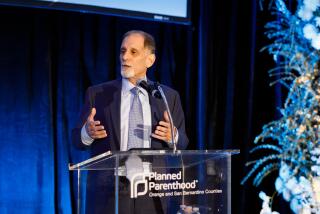Hobby Lobby’s Obamacare objection: Readers aren’t buying it

Can a business like Hobby Lobby legitimately claim religious freedom in its legal battle against the Affordable Care Act’s mandate that insurance plans cover drugs some people believe cause abortions?
Notre Dame law professor Richard W. Garnett argued on The Times’ Op-Ed page Thursday that Hobby Lobby -- which, he notes, closes its stores on Sundays so its employees can go to church, has Christian music as its stores’ background music and doesn’t sell shot glasses -- has the beliefs of its owners so embedded in its business practices that requiring it to cover abortifacients would indeed violate its religious freedoms.
So far, readers have bristled at Garnett’s argument.
YEAR IN REVIEW: Washington’s 5 biggest ‘fails’ of 2013
More than a dozen people have sent letters in response to Garnett, and all say the healthcare law should apply to Hobby Lobby as it would any other for-profit business. Many say the business is wrong to impose the religious beliefs of its owners on its thousands of employees; others warn of a slippery slope should businesses be granted a religion-based exemption from a federal law. Some say Hobby Lobby is misinformed by viewing the “morning-after pill” as a drug that induces abortion.
Here are their letters.
Michael Pirrung of Irvine says Hobby Lobby can’t claim conscientious-objector status:
“However artfully the Hobby Lobby position regarding insurance coverage of certain contraceptives (because they act as abortifacients) is argued, it ignores an inconvenient fact: These contraceptives (and early abortions) are legal, however repulsive they may be to Hobby Lobby.
“Personally, it is always possible to take a moral stance not to engage in an activity at odds with one’s own beliefs. This is the essence of the conscientious-objector status for Quakers that excused them from military service. However, pacifists may not decline to pay income taxes for the portion of the federal budget for defense.
“Since the Supreme Court has already ruled in favor of one aspect of the Affordable Care Act as a tax, there seems no difference in law between the individual mandate to have insurance and mandated coverage of legal contraceptives. The individual choice not to do something does not equate to a right not to pay for it collectively.”
Cypress resident Diane Welch says Plan B isn’t abortion:
“Since the courts have decided that corporations are people for certain legal purposes, we find ourselves debating whether a company, Hobby Lobby -- a for-profit business with thousands of employees of different faiths -- can dictate workers’ religious beliefs by restricting a vital portion of total coverage from their employees.
“It seems the company has no problem with some forms of contraception, and that its objection to the ‘morning-after pill’ is based on a misconception. There is a difference between an abortifacient and a contraceptive. Plan B prevents an ovum from being implanted at all; there is nothing to abort.
“The business model of Hobby Lobby as a Christian-owned company is well known. Its action on the Affordable Care Act to prevent thousands of its employees from exercising their constitutional rights tarnishes the very image they wish to portray.”
Liz Fautsch of Encinitas says Hobby Lobby’s religious freedom is intact:
“Garnett writes, ‘It would be strange if the law were to welcome sermonizing from Starbucks on the government shutdown but tell the Greens and Hobby Lobby to focus strictly on the bottom line.’
“Hobby Lobby is free to sermonize all it wants on abortion. What it should not be allowed to do is interfere in women’s healthcare choices.
“Health insurance is not a Hobby Lobby product; it is a product of the private insurance marketplace. It is illogical for one company’s religious preferences to dictate the composition of another company’s products or how consumers choose to use them.”
Santa Monica resident Joan Walston speaks up for Hobby Lobby’s non-Christians:
“Garnett does a great job describing how Hobby Lobby reaches out to the Christian community. Its policies, he says, enable the owners and their business to express their faith and ‘exercise their religion.’
However, I wonder how this strikes Hobby Lobby employees who are not Christian, who celebrate the Sabbath on another day of the week or perhaps not at all, and who don’t necessarily wish to listen to Christian music all day long. In what way do such policies respect their faiths?”
Barry Davis of Agoura Hills makes the case for all businesses following the law:
“To Garnett’s argument, I have one distilling question: What if the business owners are strict Christian Scientists? Do those owners then have the right to refuse to offer all health insurance to their employees because of the belief that God heals all?
“Garnett’s tortured logic notwithstanding, Americans have a right to what the law mandates regardless of their employers’ beliefs. The argument isn’t ‘if you don’t want to live according to my beliefs, find another job’; it’s ‘if you don’t want to follow the law, don’t have a business that has employees.’
“The employers don’t park their beliefs ‘at the marketplace door.’ Why? Because businesses don’t have beliefs, only their owners do.”
ALSO:
The college-for-all model isn’t working
2013 endings: Columnist Patt Morrison on what she won’t miss
More to Read
A cure for the common opinion
Get thought-provoking perspectives with our weekly newsletter.
You may occasionally receive promotional content from the Los Angeles Times.







